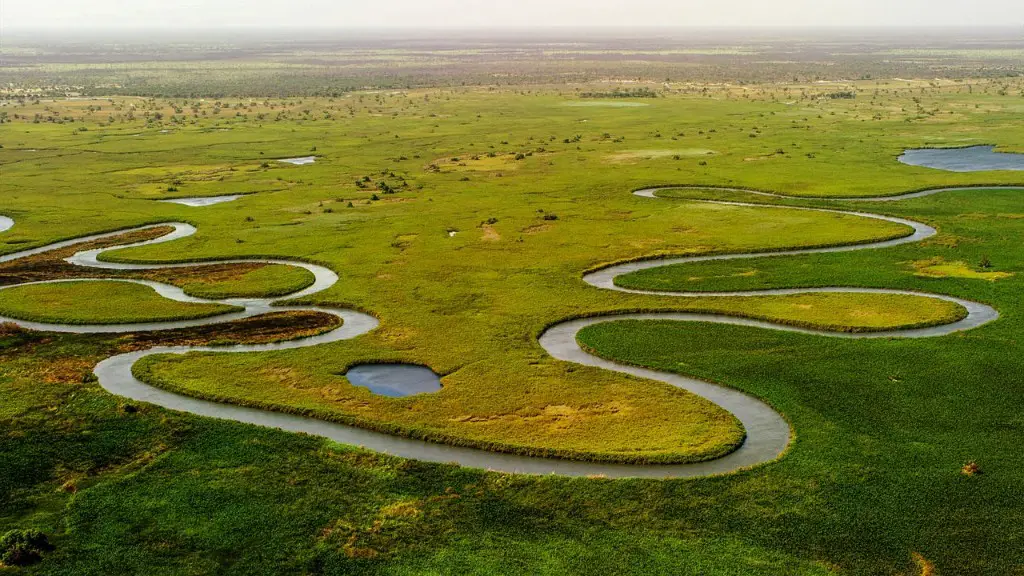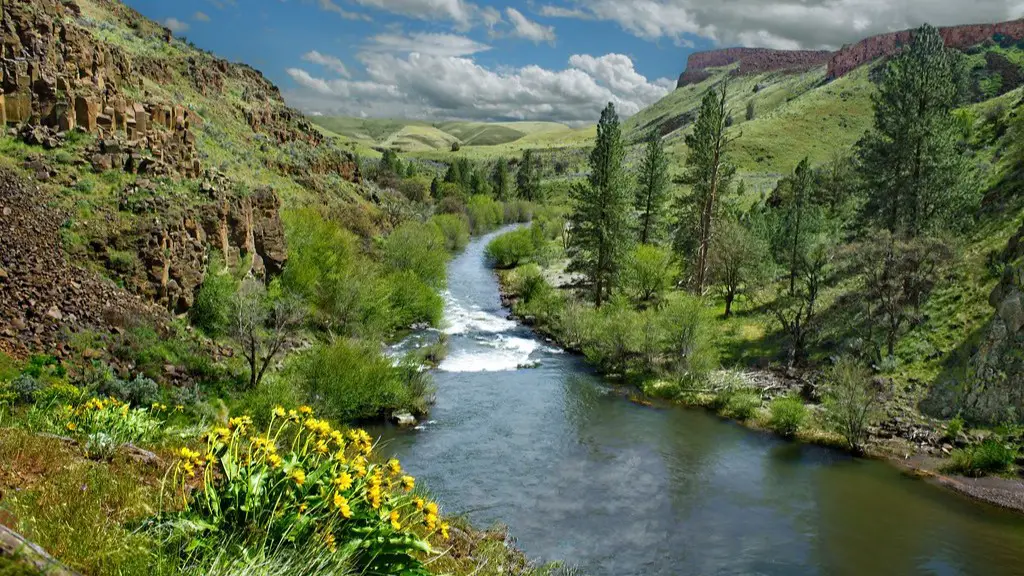Characteristics of the Mississippi River in Huckleberry Finn
The Mississippi River plays an important role in Mark Twain’s Huckleberry Finn. Its vastness and mysterious beauty both threaten and provide comfort to Huck and Jim as they travel downriver on their journey. The river is a character in itself, and its impact on the novel is both symbolic and emotional. In Huck Finn, the Mississippi River helps establish the sense of adventure, serves as a source of protection, and symbolizes freedom.
From the very beginning of their voyage, the characters are immediately taken with the power and enormity of the river. Huck is awestruck by its beauty, stating “It was mighty pretty to see… you feel mighty free and easy and comfortable on a raft”. Jim, too, is filled with admiration, proclaiming that it is “dey sparklin’ ribs all over de river”. As the two continue to journey, the river serves as a protection for them as its ample length provides shelter from potential threats. It is not just the natural benefits provided by the Mississippi that offer protection but also its immensity. With so much to explore, the characters are always in motion and ultimately protected by constantly being on the move.
Most importantly, the Mississippi allows Huck and Jim to be free. The river serves as an integral part in helping the characters escape the boundaries of racism, poverty, and the expectations of society. Huck refuses to conform to the expectations of his family and community. As he and Jim travel, a sense of freedom emanates from their voyage downriver. The river gives them a rare opportunity to be free from societal and cultural restrictions and releases them from the boundaries set in their previous lives. The Mississippi provides for the characters a blank slate for possibilities and possibly a way to create a new life for themselves.
Freedom Embodying the Mississippi River
The Mississippi River is closely linked to the idea of freedom throughout the novel. Twain’s use of this symbol is perhaps a reflection of his own childhood experiences of the river. As the story progresses, the characters become more and more enchanted by the possibilities the river provides. The Mississippi is a metaphor for freedom and offers a physical escape from their conventions. As the river progresses and offers new perils, adventures, and revelations, so too do the characters experience personal growth and new discoveries.
It is clear that the Mississippi plays an integral role in Huckleberry Finn. Twain emphasizes not only the power of the river through his detailed description, but also the power of freedom it bestows upon the characters. The river is a tangible symbol of freedom, and Huck and Jim both recognize its potential. As the two travel further and further downriver, the mysteries and vastness of the Mississippi provide a sense of hope and the promise of an adventure.
Journey on the Mississippi River
The Mississippi River in Huckleberry Finn symbolizes more than just a physical journey and provides a deeper meaning to the characters as they gain self-knowledge. Along the way, Huck and Jim pass through many elements, such as the towns and cities located along the river. Each place they pass through serves as a reminder of the limitation set by society. Since they have not yet reached true freedom, the river remains full of potential and provides an opportunity to continue their journey.
The river also functions as a way for the characters to escape from the pressures of the outside world. The journey downriver is an unpredictable one and, in many ways, it allows Huck and Jim to be unaware of what lies ahead. In this sense, the river also serves as an opportunity to be completely present in the moment and to take every chance and experience to its fullest.
Huck and Jim’s journey on the Mississippi River illustrates their growth and ultimately, their pursuit of true freedom. As their journey progresses, the physical aspects of the Mississippi come to represent the transformation in emotions and viewpoints that the characters undergo. The river instils a sense of liberation and the potential for a brighter future.
The Mississippi River and Huck’s Personal Growth
The object of Huck’s journey and his ultimate goal is to find personal freedom. Through the journey and events that take place on the Mississippi, Huck undergoes immense personal growth as he learns how to live a life full of freedom. The further they travel, the more freedom they find, and the more their relationship deepens. As their bond grows stronger, the river comes to symbolize their mutual understanding and the differences they have overcome.
The Mississippi River’s impact on the novel can be best seen through Huck’s development. More than just a physical journey, the Mississippi provides a platform for Huck to undergo personal growth and discover what freedom truly means. Through his interactions with Jim and others he meets, he learns lessons of friendship, tolerance and understanding. In the end, the Mississippi River is not only a symbol of the experience but a transformational tool that helps Huck recognize his inner potential and true desires.
The Role of the Mississippi River Within the Novel
The Mississippi River is a character in its own right in Huckleberry Finn. It serves as a physical force, embodying power and beauty, as well as a moral force, embodying freedom and potential. Twain utilizes the river’s vastness and unpredictability to create a sense of adventure and excitement that is integral to the novel. The river offers a way for Huck and Jim to explore the unknown and to escape the conventions of society. It is a source of strength and protection and ultimately serves as a platform on which they can learn and grow.
Moreover, it symbolizes hope and the pursuit of a brighter future. It illustrates the strength of the bond between Huck and Jim and the freedom that comes with having true companionship. Twain’s use of the Mississippi River as a character in the novel serves to further the characters’ journey and to provide a platform for both physical and emotional exploration. Its power and magnitude are endlessly captivating, providing both a physical representation of freedom and an emotional embodiment of hope.
The Mississippi River in Huck’s Moral Growth
Throughout the novel, Huck is confronted with a number of moral dilemmas that he must learn to grapple with. These moments present him with a chance to assess his own beliefs, which have been heavily influenced by the society in which he was raised in. The Mississippi River is a symbol of his moral growth and allows him to recognize himself. With its mysteriousness and unpredictability, the river helps Huck become aware of his true beliefs and eventually develop a strong sense of himself.
The Mississippi provides Huck with the space and opportunity to reflect on some of his moral choices. He often contemplates the choices he has made and is forced to recognize the value of friendship and humanity. By the end of the novel, the Mississippi river is a symbol of his own moral awakening, acknowledging that his decisions can no longer be dictated by society but require him to possess a strong sense of personal judgement.
The Mississippi River in Huck’s Quest for Inner Freedom
The Mississippi River serves as a representation of Huck’s own inner freedom. As he recognizes the importance and value of his friendship with Jim and the power of independence, he begins to realize his own potential. By the end of the novel, the river symbolizes his own pursuit of liberation and the development of his personal beliefs. It also serves to illustrate the dangers of societal expectations as they are in opposition to his own inner freedom.
Apart from the physical voyage, Huck’s journey down the Mississippi is an emotional one as well. It serves as an allegory of his own personal growth and development. He learns newfound principles in morality and humanity and is eventually able to view things with a fresh outlook. The river’s vastness and unpredictability helps him uncover who he truly is and encourages him to take control of his own destiny.
The Mississippi River in Huckleberry Finn is an inspiring representation of freedom and potential. Its power and beauty envelop the characters and helps them undertake a journey of discovery and growth. As the novel progresses, the physical and emotional aspects of the river provide the characters with a space to reflect on their experiences and the true meaning of freedom.




